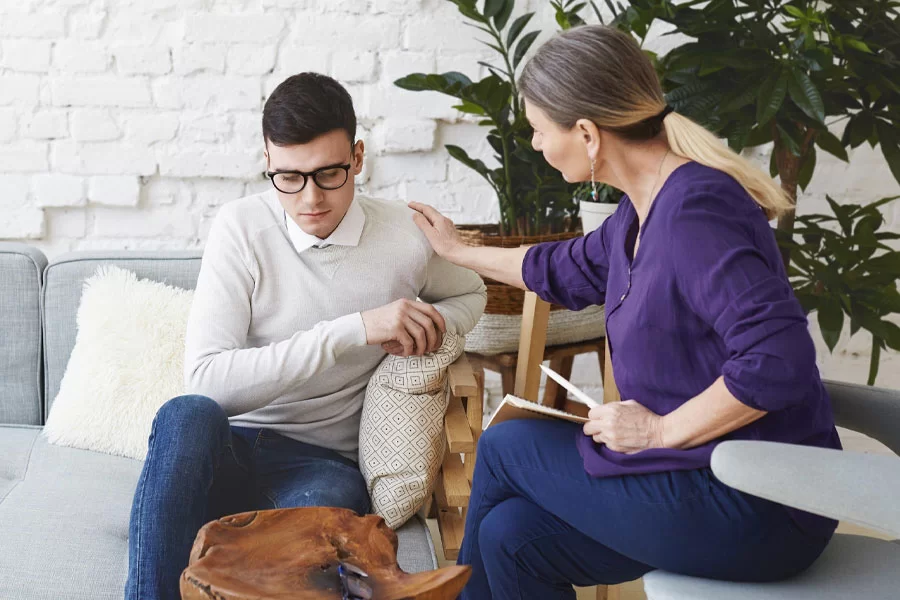- Mumbai, New Delhi, Bangalore
- (+91) 81518 30000
- WhatsApp Now
- contact@vedawellnessworld.com
The symptoms of anxiety tend to vary from person to person as it’s a highly subjective experience. Anxiety becomes pathological when it starts to interfere with an individual’s everyday life including their social, occupational, or other important areas of functioning. The feelings of anxiety are often accompanied by worried thoughts / tension, nervousness, panic or physiological symptoms such as palpitations, sweating, hyperventilation etc.


Self help: involves steps that an individual can take for self care, that may help in some less severe cases, for example, get enough sleep, learn about one’s triggers, practicing a healthy life style, journalling, aroma therapy, indulging in hobbies and interests, etc.
An ideal luxury anxiety treatment center seamlessly blends opulent amenities with cutting-edge treatment for anxiety, offering a tranquil sanctuary for healing. From plush accommodations to personalized diet plans, every aspect is meticulously crafted to nurture the mind, body, and spirit. Expert clinicians employ evidence-based therapies, personalized to each individual, fostering a sense of empowerment and progress. Serene surroundings and holistic modalities further enhance the therapeutic journey, promoting holistic well-being. At the pinnacle of anxiety treatment centers, luxury meets efficacy, creating an unparalleled environment for transformation and renewal.
Veda stands out as the premier choice for those seeking luxury rehab for anxiety, with a commitment to excellence in both care and comfort. With our renowned team of expert clinical consultants and a dedication to personalized, evidence-based therapies, we offer a path to healing that combines opulence with efficacy, ensuring a transformative experience like no other.
Phase 1: Comprehensive Mental and Medical Assessments
Clients undergo a thorough orientation followed by comprehensive medical, psychiatric, and nutritional evaluations conducted by expert consultants. These evaluations help establish a clear understanding of each client’s physical and psychological state, facilitating the development of tailored treatment plans. Psychological assessments are conducted to understand the specific needs of each client, leading to psychoeducation sessions that enhance clients’ understanding of their anxiety and initiate various therapeutic techniques.
Phase 2: Psychoeducation and Initial Adjustment
During this phase, clients receive personalized sleep schedules, daily routines, and dietary plans based on their initial assessments. These plans are developed collaboratively to support clients’ physical and mental adjustment. Psychoeducation continues, helping clients understand their anxiety disorders and the steps necessary for managing their symptoms.
Phase 3: Psychotherapy
Individual Therapy:
Tailoring treatment to address specific issues the patient is facing, applying evidence-based therapeutic techniques to real-life situations, and working on individual goals like reducing anxiety symptoms, improving coping mechanisms, and enhancing emotional regulation.
Group Skills Training:
Helps learn practical skills in a group setting to manage anxiety, relationships, and stress. Typically involves weekly sessions, each lasting about 1.5 hours, with a group of individuals.
Stages of Psychotherapy:
Stage 1: Reducing Acute Anxiety Symptoms
The initial stage focuses on reducing acute anxiety symptoms such as panic attacks, excessive worry, and physical symptoms like rapid heartbeat or sweating. Techniques such as relaxation exercises, breathing techniques, and immediate coping strategies are introduced.
Stage 2: Cognitive Restructuring
Once the acute symptoms are managed, the next stage involves cognitive restructuring. This helps clients identify and challenge irrational or negative thought patterns that contribute to their anxiety. Techniques such as Cognitive Behavioral Therapy (CBT) are commonly used.
Stage 3: Exposure Therapy
This stage involves gradual exposure to anxiety-provoking situations in a controlled and safe manner. The goal is to reduce avoidance behaviors and help clients build confidence in managing their anxiety triggers.
Stage 4: Sustaining Recovery and Long-Term Coping Strategies
The final stage involves maintaining the progress achieved and focuses on developing long-term coping strategies and resilience. Clients learn techniques to manage stress, maintain a healthy lifestyle, and prevent relapse. This includes building a strong support network and creating a personalized anxiety management plan.
Phase 4: Preparing for Discharge
Therapists work with clients to develop a comprehensive relapse prevention plan and address reality adjustment issues. This ensures that clients are prepared for the outside world and can effectively apply the techniques learned during therapy.
Phase 5: Post-Discharge
Follow-up sessions are scheduled to monitor clients’ progress and provide ongoing support. These sessions are crucial for ensuring long-term recovery and well-being, helping clients maintain the gains achieved during treatment.
Daily Holistic Practices
To support your recovery, we offer daily sessions in:
Additionally, we provide holistic and alternative therapies (available at an additional cost) such as:
Additional Support
We provide various alternatives to support recovery and have a 24/7 center administration team that monitors and manages any additional addictions, helping clients gradually reduce their consumption.
Family and Couple Interventions
Understanding the importance of social support, we offer family and couple interventions during weekends or based on availability to foster understanding and support outside the center.
